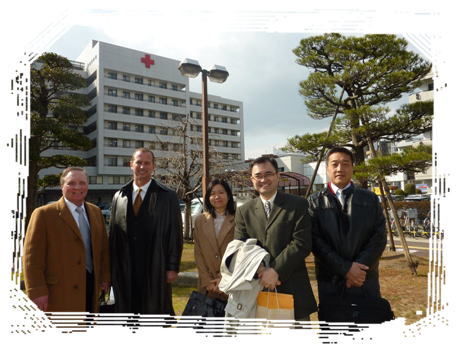Over the Years
Home > Over the Years > > Three Doctors from Brazil Invited for Training
Three Doctors from Brazil Invited for Training
Names and Titles of Trainees:
Airton Seiji Yamada, Nuclear Medicine Physician
Hospital Nossa Senhora das Gracas
Amalia Kasuko Misawa Tahara, Anesthesiologist
Hospital Nipo Brasileiro (Japanese Brazilian Hospital)
Americo Kiyoshi Kitahara, Plastic Surgeon
Hospital of Santa Cruz
Period of Training:
Training Organizations (in order of visits):
Hiroshima University Hospital
Hiroshima Red Cross Hospital & Atomic-bomb Survivors Hospital
Radiation Effects Research Foundation
Hiroshima University Hospital Advanced Emergency and Critical Care Center
Hiroshima Atomic Bomb Casualty Council
Kurakake Nozomi-en (A-bomb survivors nursing home)
Hiroshima University Research Institute for Radiation Biology and Medicine
Hiroshima Peace Memorial Museum etc.
Training Course:
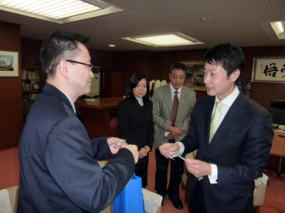
Trainees paying a courtesy visit to the Governor of Hiroshima Prefecture Hidehiko Yuzaki (right)
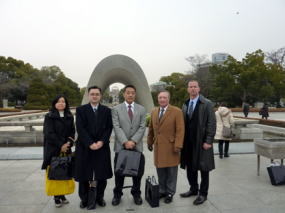
In front of the Cenotaph for the A-bomb Victims with doctors from Los Angeles who were participating in the training together
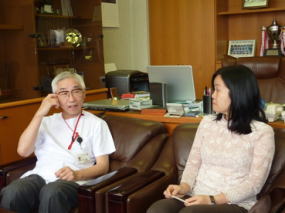
President of HICARE Hiroo Dohy, (President, Hiroshima Red Cross Hospital & Atomic-bomb Survivors Hospital) and Dr. Tahara (right)
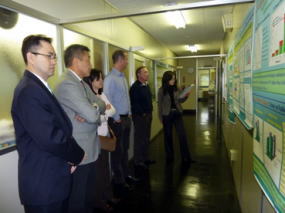
Study tour at the Radiation Effects Research Foundation
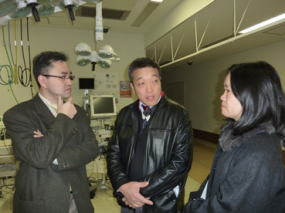
In the Hiroshima University Hospital Advanced Emergency and Critical Care Center
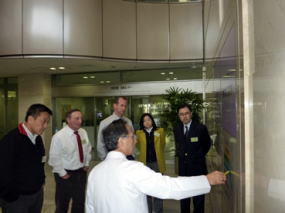
Trainees receiving an explanation from Dr. Hideo Sasaki (Director of Hiroshima Atomic Bomb Casualty Council)
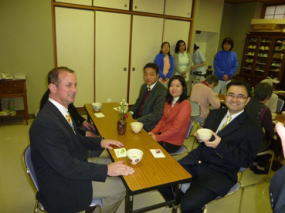
Dr. Kitahara (far right) and other members enjoying tea ceremony at Kurakake Nozomi-en
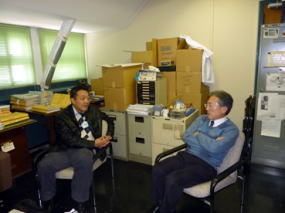
Dr. Nori Nakamura, Chief Scientist of Radiation Effects Research Foundation (right) and Dr. Yamada
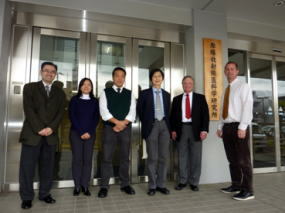
With Professor Yoshio Hosoi of Hiroshima University Research Institute for Radiation Biology and Medicine (third from right) at the entrance of the Institute
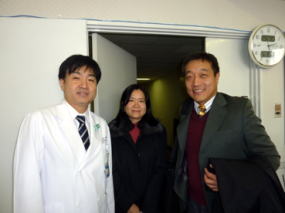
Dr. Kazuo Awai, Department of Radiation Oncology, Hiroshima University Hospital (left), Dr. Yamada and Dr. Tahara
Feedback
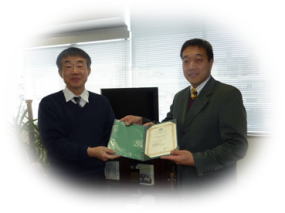
Dr. Yamada (right) with Professor Yasushi Nagata, Department of Radiation Oncology, Hiroshima University Hospital at the Training Completion Ceremony
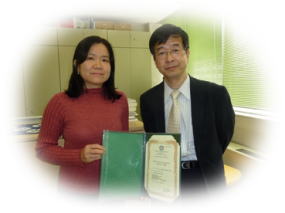
Dr. Tahara (left) with Dr. Masashi Kawamoto, Professor of Department of Anesthesiology and Critical Care, Hiroshima University Hospital at the Training Completion Ceremony
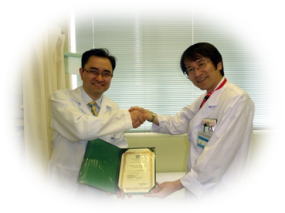
Dr. Kitahara (left) with Professor Michihiro Hide of Department of Dermatology, Hiroshima University Hospital at the Training Completion Ceremony
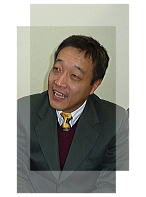
[Dr. Yamada]
I have gained knowledge of medical technologies and their practical applications in a society totally different from my country, as well as about holistic perspectives for cancer patients. The training was also useful to understand details of the actual situation of A-bomb survivors and the various problems caused by atomic weapons. I will share what I learned here with other doctors in my country. I realized that the HICARE training is an excellent and well-prepared program. If trainees could know in advance what HICARE expect them to achieve in this training and what the purposes of this training are, trainees would be able to make better preparations, such as making contact with the Association Hibakusha-Brazil for Peace and other related organizations to draw even better outcomes from the training.
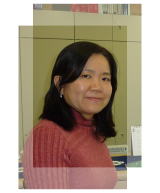
[Dr. Tahara]
The programs in the HICARE training are well organized with many interesting contents. I was able to understand that radiation has not only physical effects on people but also mental ones. I was surprised to learn about the responses (in terms of resources, facilities, investments, etc.) of the Japanese government to support A-bomb victims. I will do my best to support radiation-exposure victims in my country. Thank you very much.
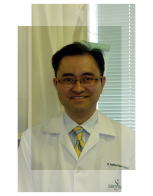
[Dr. Kitahara]
I was able to have a valuable experience through the HICARE training. Although I had spent a few years at Kyoto University, this was the first time to visit Hiroshima.
Since the training was arranged in a very flexible schedule, we were able to choose convenient dates for flights, returning, and accommodation from several choices. Thanks to such consideration, we were able to spend the days very comfortably during this training and it became an unforgettable experience.
I cannot thank you enough for giving me all these opportunities. I would like to share what I learned through this experience with other doctors and support A-bomb survivors living in Brazil (and other countries, if possible). To achieve world peace, I will spread all my knowledge and the importance of HICARE throughout my country.
